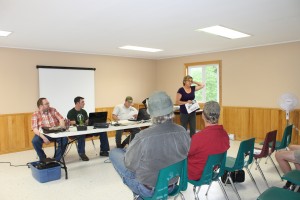Community Conversations: All About Hops
Stephanie Kelley
The Hops Presentation was part of the Community Conversations Initiative. Francine St Amand invited three guests who work with hops to share their knowledge and expertise at this workshop.
We got entertaining and interesting information from Nick Southan, Joe Gee and Mitch Biggar. These guys are passionate and interested in what they do, and their enthusiasm was infectious.
As family farms continue to be swallowed up by big agribusiness enterprises, some local farmers are looking to new crops to cash in on and hops offers hope!
Craft Beer Brewing is one of the fastest growing businesses in New Brunswick, and right now, the hops grown in the province provides less than one percent of the hops currently needed by New Brunswick Craft Brewers.
There are currently 12 craft breweries operating in New Brunswick, with four more applications in the works, and all of them need lots of hops to operate.
Nick Southan of Southan Farms in Wicklow is a fourth generation farmer. Three years ago he began cultivating five acres of hops.
Hops is a perennial vine that can grow up to 12 inches per day under the right conditions. Ideal growing conditions for hops cultivation is between the 35th and 55th parallels on the planet, and New Brunswick sits on the 46th parallel, so we have a perfect climate for growing this crop.
Hops is a long term investment. There are hops plantations in the US that have been producing crops since the 1930’s. But this means that this is a crop tht you plant once, and then maintain.
Nick is enthusiastic about this crop, but he did point out that the crop takes a few years to actually begin producing a profit.
The plantations need to be set up with tall poles, 22-24 tall that are set 4 feet into the ground so the vines have 18 to 20 feet to grow up. Cord is strung between the poles and hung to the ground at intervals to provide the young vines (also called bines) to climb up.
Hops are fairly hardy plants, but they do need 30 inches of rain per year, and NB averages about 12 inches per year, so the crop needs to be irrigated. The plants are also susceptible to aphids, spider mites and flea beetles, as well as downy mildew and powdery mildew.

Nick explained that he uses a torch very carefully to kill mildew spores in the soil, so hops plants don’t require excessive chemicals.
Hops don’t send out little tendrils like most vining plants, the stem of the plants are covered with rough little spines, like Velcro, that grab onto growing surfaces.
Joe illustrated this perfectly with a little film he’d made. Joe became interested in growing hops a couple of years ago, and now has a small plantation on his farm in Carlingford.
However, as he showed us in his film, he’d neglected to hang cord for his vines to grow up, so they’d exploded across the ground and into each other and other plants, resulting in a Gordian Knot of vegetation!
Humulene is the hops flavour that brewers are looking for, and every species of hops provides a different taste experience. Hops provide the bitterness, flavour and aroma of beer and ale.
Even hops of the same species will have different flavours depending on where they are grown, everything in their growing environment affects the outcome and taste of the crop.
Keiths Beer uses Cascade hops to flavour their famous brew. Beer is the perfect beverage to quaff with hot and spicy food, because hops helps to kill the heat sensation in your mouth as you eat.
Mitch Biggar will be opening Railcar Brewing Company, a Nano Brewery, in Bristol next month. He prefers to use whole leaf hops to flavour his brews, and would love to source all of his hops from within New Brunswick.
Mitch told us that beer brewers are brothers in arms…. There is a lot of competition to produce the best beer, but all craft brewers want to see the Microbrew industry expand.
Craft brewing offer employment and industry to communities, as well as far superior beer than commercial products. Right now, craft brewing is a 15 billion dollar a year industry in North America, and it is growing every day so there is huge potential for this crop in New Brunswick.
Take back our future by taking back our farms and our lands!
